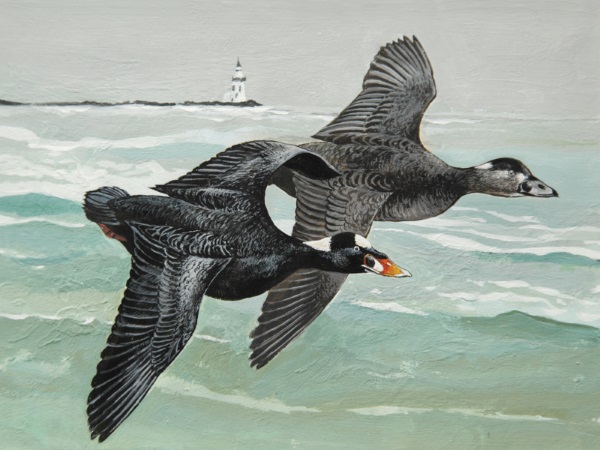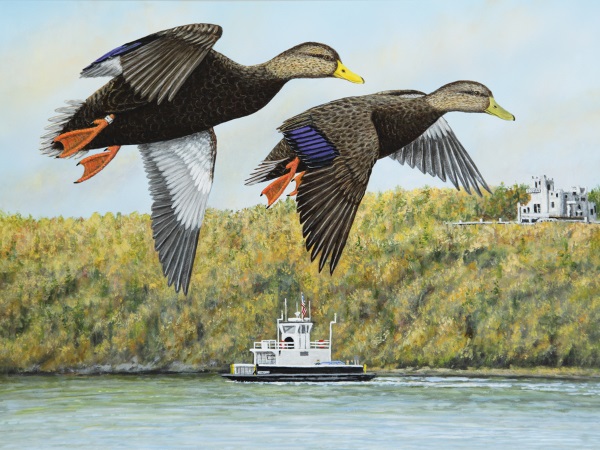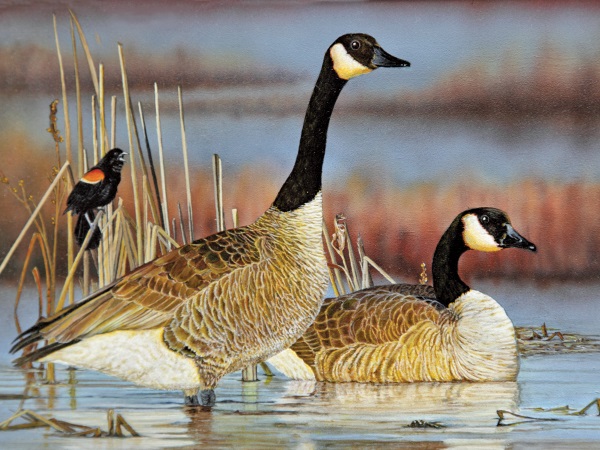Press Releases

05/24/2017
DEEP Announces Winner of 2017 Connecticut Duck Stamp Art Contest
In a contest filled with great artwork, a panel of judges recently selected world renowned and Connecticut artist Chet Reneson’s depiction of a pair of surf scoters flying at the mouth of the Connecticut River with the Saybrook Jetty and Lighthouse in the background as the winner of the Department of Energy and Environmental Protection’s (DEEP) 2017-2018 Connecticut Migratory Bird Conservation (Duck) Stamp Art Contest. Chet has been painting and carving for over half a century and resides in Lyme. His painting was chosen out of a total of 22 entries submitted by artists from across the country, including a record 12 from Connecticut artists.
Paintings were judged in six categories: suitability for reproduction, composition, habitat suitability for that species, anatomical correctness, eye appeal, originality, and whether a recognizable Connecticut landmark or habitat was used. Chet’s painting will be the image for the 2018 Connecticut Duck Stamp. A pair of American black ducks flying in front of Gillette Castle and the Chester Ferry painted by Broderick Crawford of Georgia placed second. Broderick’s artwork has placed third twice and this was the second time his work has been runner-up. Third place went to the Clayton Family of Ohio for a painting of a pair of Canada geese painted by Matt Clayton. The Clayton Family has submitted artwork every year, and Christine placed second in 2015 and third in 2016.
The Winning Artist: Chet Reneson was born and raised in Connecticut. He developed an interest in drawing and painting at a very early age and, by the age of 12, was producing exceptionally detailed drawings and paintings. Over the past 50 years, his work, particularly his watercolor paintings, have attracted and been highly sought after by collectors and sportsmen alike. Chet has won a number of prestigious awards, such as being named Artist of the Year by Ducks Unlimited, Trout Unlimited, and the Atlantic Salmon Federation. The Connecticut Migratory Bird Conservation Stamp Contest is Chet’s first win in such a contest. Never shying away from hard work, much of Chet’s artistic work has reflected the passions of his life and experiences. He has always enjoyed hunting and fishing and, as the years have passed, he now concentrates on hunting upland game birds and fishing for landlocked salmon and brook trout. He taught his son and grandchildren the crafts of the sporting trade and continues to run his hunting dogs on a daily basis.
First Local Artist to Win Contest: The DEEP Wildlife Division continues to encourage local artists to submit paintings for this contest. Chet’s win marks the first time a Connecticut artist has taken first place. It is hoped that this win will inspire more Connecticut artists to showcase their talent and highlight the beautiful natural resources in our state. The top three paintings will be on display through the end of September 2017 at the DEEP Wildlife Division’s Sessions Woods Conservation Education Center in Burlington. Sessions Woods is located at 341 Milford Street in Burlington, and is open to the public on Mondays through Fridays from 8:30 AM to 4:00 PM.
Background on the Connecticut Migratory Bird Conservation (Duck) Stamp Program: The program was initiated in the early 1990s when concerned sportsmen worked with DEEP to develop legislation that would generate revenue for wetland conservation. Modeled after the federal Duck Stamp Program, Connecticut’s program requires the purchase of a state Migratory Bird Conservation Stamp, along with a hunting license, to legally hunt waterfowl and other migratory game birds. By state law, funds generated from the sale of Duck Stamps can only be used for the development, management, preservation, conservation, acquisition, purchase, and maintenance of waterfowl habitat and wetlands, as well as the purchase and acquisition of recreational rights or interests relating to migratory birds.
“The Duck Stamp Program is a great example of how the North American Model of Wildlife Conservation works – users of the resource pay into funds whose monies are solely dedicated to conservation,” said Rick Jacobson, DEEP Wildlife Division Director. “The Connecticut Duck Stamp fund is a vital source of money for many of the wetland projects that are conducted in our state. Federal aid dollars from the hunter-funded Pittman-Robertson Program can also be used for wetland conservation.”
The Duck Stamp Program has generated over $1,500,000 for the enhancement of wetland and associated upland habitats, as well as garnered additional monies for Connecticut through matching grants from federal conservation initiatives. By combining Duck Stamp funds with these additional monies, over $4 million dollars have been available to complete wildlife conservation projects. Thus, Connecticut has received a 4:1 return on Duck Stamp monies. Over 3,445 acres of wetlands in the state have been restored or enhanced using Duck Stamp funds, mostly on state-owned wildlife management areas. The funds also have been used to purchase 75 acres of critical wildlife habitat and conduct habitat projects at over 50 sites statewide. These efforts have benefitted many of the approximately 274 birds, fish, amphibians, and reptiles of our state that rely on clean, healthy wetlands.
Hunters are not the only ones who can purchase Connecticut Migratory Bird Conservation Stamps. Anyone who wishes to support wetland conservation and restoration in our state may buy a Duck Stamp. Stamps can be purchased for $17 each wherever hunting and fishing licenses are sold: participating town clerks, participating retail agents, DEEP License and Revenue (79 Elm Street in Hartford), and through the online Sportsmen’s Licensing System(www.ct.gov/deep/sportsmenlicensing). Upon request, stamps can be sent through the mail. To learn more about the Connecticut Duck Stamp and the Art Contest, visit the DEEP website at www.ct.gov/deep/ctduckstamp.
Reproduction prints of the winning Duck Stamps, signed by the artists and suitable for framing and display, are also available. Please contact the DEEP Wildlife Division’s Migratory Bird Program at 860-418-5959 for more information on purchasing reproductions.
Do your part for conservation. Buy a duck stamp and contribute to habitat protection and restoration.
Attachments – First, Second, and Third Place winners of the 2017-2018 Connecticut Migratory Bird Conservation Stamp Art Contest



- Twitter: @CTDEEPNews
- Facebook: DEEP on Facebook

